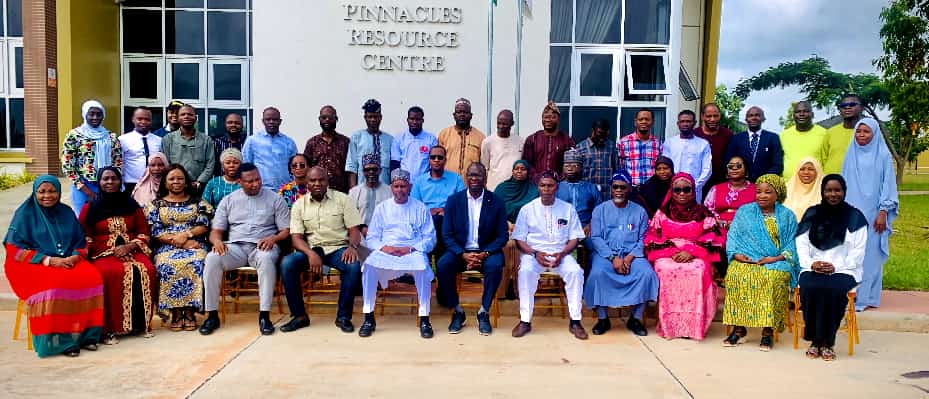At the recently concluded Summit Senior Grantsmanship Training Programme, organised by Artificial Intelligence for Females in STEM (AI4FS) held from June 23rd to June 27th, 2024, participants agreed to establish broad-based collaborations following the Quadruple Helix model involving Government, Academia, Industry, and Society.
In her keynote address at the opening ceremony on June 24th, Dr. Mireille Elhajj addressed several critical topics, including the Sustainable Development Goals (SDGs), extreme weather events, and the role of Artificial Intelligence (AI) in modern processes. She emphasized that the SDGs aim to tackle poverty, climate change, and environmental protection, urging governments to take more significant action.
Dr. Elhajj highlighted the increasing frequency and severity of extreme weather events, distinguishing between short-term weather-related incidents and long-term climate-related events. Additionally, she discussed the transformative potential of AI, Big Data Analytics, and the Internet of Things (IoT) in optimizing processes, enabling data-driven decisions, and facilitating real-time communication.
Dr. Elhajj also provided guidance on crafting successful grant proposals, underscoring the importance of strong scientific content, robust management, solid partnerships, and a focus on Environmental, Social, and Governance (ESG) and Equity, Diversity, and Inclusion (EDI). She stressed the need to engage diverse stakeholders, maintain transparent communication, and foster collaboration.
A comprehensive communication and impact plan is crucial, addressing environmental impacts, societal benefits, and educational opportunities. Furthermore, Dr. Elhajj cautioned against biases in AI, advocated for a balanced approach, and emphasized addressing local and global challenges, including cybersecurity and youth engagement, to contribute effectively to solving specific issues, particularly in Nigeria.
Similarly, three other facilitators spoke about the importance of team building as a prerequisite for senior grantsmanship in the 21st century, techniques for developing award-winning research grants, preparing financials for proposals, pitching business and proposal ideas, review of several case studies and preparation of award concept notes.
Prof. Bamidele Adebisi from Manchester Metropolitan University emphasized setting up a grant-winning team with well-defined roles and responsibilities for team members. He also discussed the fundamentals of grant writing, including terminology and key components of a grant proposal. Furthermore, he elucidated key success factors for a fundable proposal and guided participants through strategies for researching funding opportunities and crafting a Concept Note. In another session, Prof. Adebisi discussed the importance of Gender, Diversity, and Inclusion (GDI) in grant proposals, how to incorporate GDI principles into project planning and design, and the need to implement GDI strategies in project execution and management.
Prof. Abiodun Musa Aibinu discussed strategies for leading grantsmanship teams to succeed. He highlighted the importance of framing a concept note and methods for creating engaging grant proposals, developing skills in storytelling, and persuasive writing. Participants were also taken through the approach of developing comprehensive grant proposals tailored to their university's or organization's funding needs and keys to identifying and estimating various cost categories in project budgets. He also shared experiences on the use of emerging technologies to aid in presentation and proposal development.
Dr. Elhajj also led a session on designing and structuring a compelling pitch deck and how participants can develop the skills to deliver dynamic and persuasive presentations. Practical tips and best practices for developing a good business pitch and solving Nigeria's problems through grantsmanship were also presented at the event.
Prof. Francisca Oladipo, a leading advocate of grantswomanship, guided participants through developing a compelling pitch that incorporates diverse perspectives and how to validate their market and idea through strategic pitching. She also provided valuable and actionable feedback to refine participants' pitches and how they can tailor their pitches to resonate with any audience.
The four-day event saw participation from management and leadership figures of academia, government agencies, industries, NGOs, and other pertinent stakeholders in the Quadruple Helix-model including Olabisi Onabanjo University, Ago Iwoye; Federal Polytechnic, Ayede; Ominicom Solutions Ltd, Lagos; Pinkberg Ink, Lagos; Yaba College of Technology, Yaba; Summit University, Offa, Kwara State; National Information Technology Development Agency (NITDA); Obafemi Awolowo University, Ile-Ife; University of Ilorin, Ilorin; Manchester Metropolitan University, Manchester; Osun State University Teaching Hospital, Osogbo; Federal University of Technology, Minna; Federal Polytechnic, Ede; Kwara State University, Malete; Federal Polytechnic Daura; University of Ilesa, Ilesa; Osun State and Abubakar Tafawa Balewa University, Bauchi.
The programme is supported by the Royal Academy of Engineering UK Grant under the Higher Education Partnerships in Sub-Saharan Africa (HEP-SSA) Programme with project ID HEPSSA-2224-4-100184

